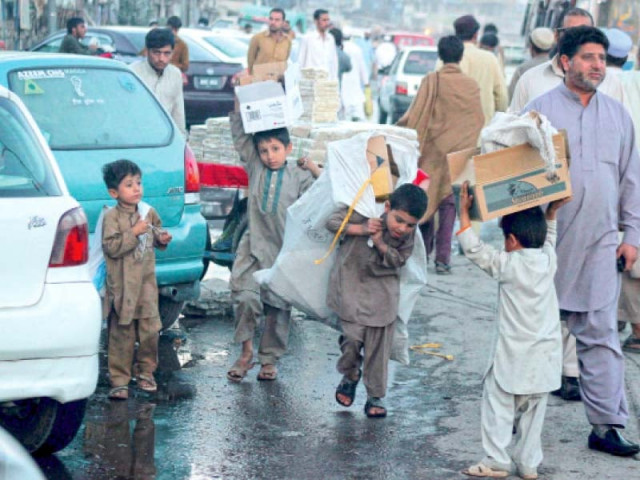Another man’s treasure: Sifting through garbage, yearning for education
Little children rummage through waste to earn a living

Children carry empty cartons in Karkhano Market. PHOTO: MUHAMMAD IQBAL/EXPRESS
Sneaking a glance at children with their schoolbags and pristine uniforms, 12-year-old Hussain cannot help but feel envious. He also carries a sack, but instead of books, his is filled with garbage.
However, as the saying goes, one man’s trash is another’s treasure. Speaking to The Express Tribune, the bare-footed 12-year-old says it is routine for him to come to Ring Road, where the city’s garbage is dumped, and rummage through it. “I collect papers, plastic bottles and other things from the heaps of junk and sell them to scrap dealers in Haji Camp area,” he adds.
“Many children of my age go to school. I look at them, their school bags and tidy uniforms with envy—wishing I too could be one of them,” he sighs. “I want to get an education, but abject poverty prevents me.”
He says garbage is a source of survival for his family. “I earn Rs200 a day from rubbish which for others is nothing more than a foul-smelling pile of waste,” the boy adds. “I sell plastic bottles at Rs50 per kilo.”
He says his younger brother is also a scavenger while his father earns a daily income by selling vegetables on a pushcart. “He makes up to Rs300 daily.”
Hussain goes on to add that his five sisters and four brothers live in a rented house in Shotal Banda village of the provincial capital for Rs1,000 a month.
Another scavenger, 13-year-old Saddam, sports a dark green shirt and appears to be doing a little better than Hussain as his feet are covered; albeit with repaired sandals. “I have been doing this for the last three or four years.”
He adds his father’s ailments do not allow him to earn and that is the reason he (Saddam) entered this business. “I earn Rs200 to Rs300 per day,” he says. “I too desire to go to school, but all my wishes remain unfulfilled.”
When asked if he would like to become a doctor or an engineer if given a chance, the boy’s silence spoke a thousand words. Poverty has left him helpless.
Society for the Protection of the Rights of the Child (SPARC) Programme Manager Khalid Mehmood says no survey has been conducted to determine the number of street children in Pakistan. “It is assumed that more than 1.5 million children are working or living on the streets of the country,” he claims. “For Khyber-Pakhtunkhwa or Peshawar, we have no data.”
He laments there is no law specifically relating to street children in the country. He says while they fall under the children protection law, the regulation is not being implemented in its true letter and spirit in Pakistan.
According to Child Rights Movement Pakistan’s website, “a number of bills related to child rights are pending at the national and provincial level. There is no National Commission on the Rights of the Child with a statuary status to ensure effective implementation of Pakistan’s national and international obligations with reference to children.”
Lady Reading Hospital Senior Registrar of the Children’s A Ward, Dr Amir Muhammad says scavengers can easily catch communicable diseases like hepatitis, AIDS, gastroenteritis and skin ailments like scabies. He adds garbage collectors often jab themselves with used syringes while gathering waste material which can cause AIDS and other diseases.
According to the Environment Protection Department of Punjab, some 5.2 million people, including four million children, die each year from waste-related diseases in Pakistan.”
Published in The Express Tribune, April 7th, 2015.













COMMENTS
Comments are moderated and generally will be posted if they are on-topic and not abusive.
For more information, please see our Comments FAQ